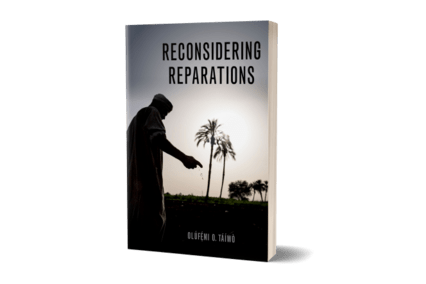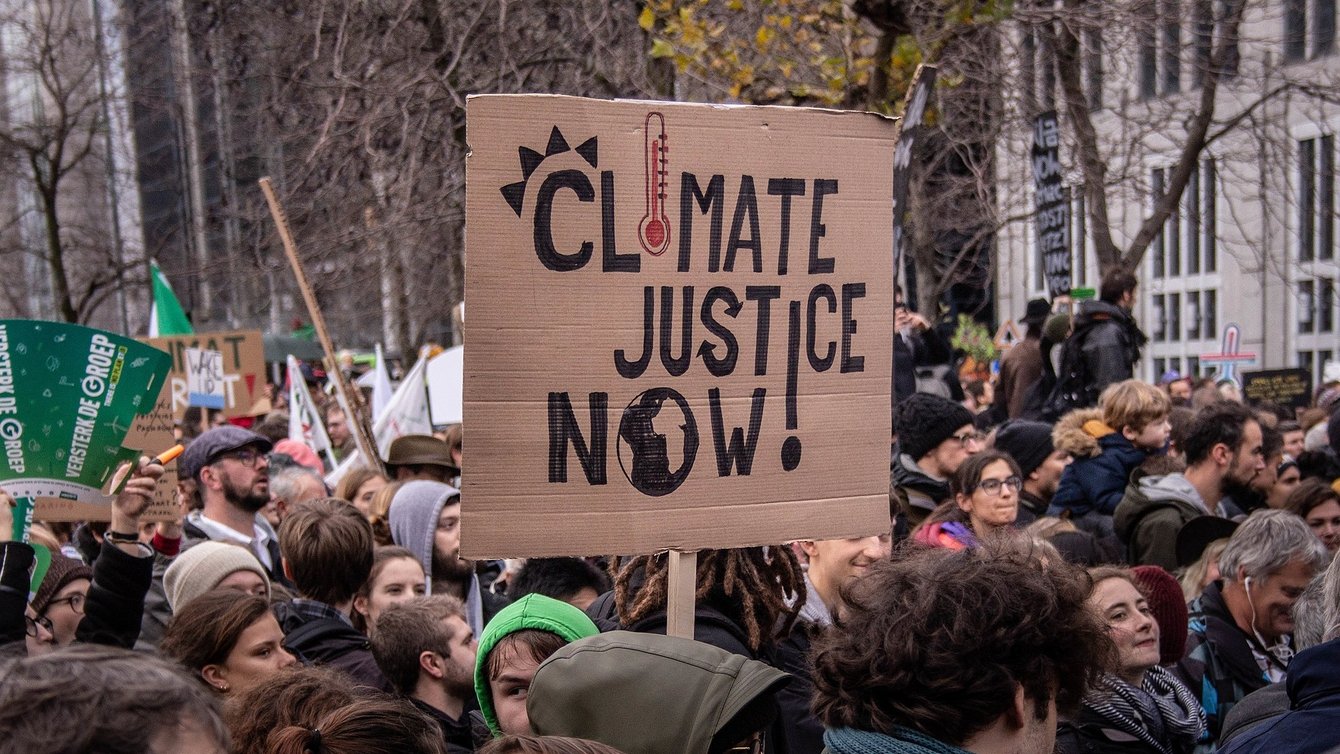There has been a recent resurgence of interest in reparations, with cities including Detroit, MI; St. Paul, MN; and Berkeley, CA either considering or endorsing institutional compensation and redress for the country’s legacy of slavery and An ideology that assumes a hierarchy of human worth based on the social construction of racial difference. Racism as an ideology claims superiority of the socially constructed category, White, over other racialized categories based on the false idea that race is a fixed and immutable reality. Learn more . In 2020, California created a task force responsible for planning a state-wide reparations process, while at the federal level, a record number of co-sponsoring legislators have signed in support of the proposed reparations bill, H.R. 40. The growing support for reparations also coincides with the accelerating effects of the climate crisis, felt worldwide. Scholars and activists have long demonstrated the link between both colonialism and slavery and the development of global capitalist systems of extraction and fossil fuel reliance that have produced the current crisis. Dr. Olúfẹ́mi O. Táíwò, a Georgetown philosophy professor and writer, offers a wide-ranging, nuanced contribution to this perspective in his recent book, Reconsidering Reparations, which suggests that the two political projects of mitigating climate change and enacting reparations could go hand-in-hand. Or, as Dr. Táíwò asks, “What if building the just world was reparations?”
Reconsidering Reparations is at once a philosophical argument and an impressive interdisciplinary synthesis of history, social sciences, disability justice theory, Black radical tradition, and philosophical discourses on race. The book begins by contextualizing the unequal distribution of climate harm and the argument for reparations within the historical arc of colonization, including the largest-scale slave trade in history. Dr. Táíwò offers a “constructivist” framework conceptualizing reparations and climate justice as a “future-oriented world-making project.” In describing possible avenues forward, he affirms the diverse range of ongoing initiatives and strategies for reparations and climate justice, such as democratization of energy, unconditional cash transfers, global climate funding, reinvestment into local communities, and other concrete strategies. Rather than advocating for any one way, Dr. Táíwò uplifts multiple, intersecting strategies, suggesting that a heterogenous collective effort to dismantle and rebuild global systems will lead us into a sustainable and equitable future.
Yet these are not purely theoretical arguments. Dr. Táíwò highlights specific targets, tactics, and organizations working to enact this vision of justice. He affirms the effectiveness of specific organizing and coalition-building strategies—including fossil fuel divestment, ending wealth disparity, and global climate funding—while also emphasizing that there is no singular blueprint for the ambitious yet necessary undertaking of “remaking the world.” Dr. Táíwò has no illusions about the enormity of this task. The book ends with the poignant message that we should think like ancestors: planting seeds though efforts that may not come to fruition in our lifetimes, in the hopes that those who succeed us will live in a healthier, more just world. Reconsidering Reparations is a necessary and timely contribution to evolving discourses on racial and climate justice.
PRA discussed with Dr. Táíwò over email the challenges and possibilities of redressing both racial injustice and the climate crisis.

Reconsidering Reparations by Dr. Olúfẹ́mi O. Táíwò
PRA: What inspired this book, and what did you hope to accomplish by writing it?
Dr. Olúfẹ́mi O. Táíwò: I had been thinking about racial justice in a really practical context of political organizing, and also in a really intellectual and historical context in my graduate work. Reparations was a topic that linked these two worlds powerfully together for me. I’m hoping that the book will contribute to practically minded conversations about reparations in the years to come, that we’ll think a bit more holistically about the challenges to racial justice of the changing political and literal environment around us.
“We can do better than shifting the pain around on the back end of the system. We can and should change it entirely.”
Can you please talk about your constructive and future-oriented view of reparations—how does this framework build on and differ from other arguments for reparations? Alternatively, how does this constructive view intervene in the current debate on reparations?
The constructive view agrees with other views that making material changes in the lives of people who receive reparations is important, and also that reconciliation, symbolism, and rebuilding relationships of trust are also important. But, though we sometimes talk as though our lives are structured by the decisions made within our arbitrary lines of the world, there’s no time like a global pandemic to reconsider how accurate that is. In fact, we live in a deeply networked economic and social system and have for some time. The constructive view adds to these some attention to the broader, planetary-scale political and economic structures that explain our social outcomes. The structure of these systems pipelines wealth and power to some places and people while channeling violence, vulnerability to predation, and pollution to other places and people, and we can do better than shifting the pain around on the back end of the system. We can and should change it entirely—that’s what the constructive view is about.
As climate change intensifies, there is the danger of protectionist and authoritarian points of view spreading across the political spectrum (such as “lifeboat ethics” and increased A term used to describe organizations, movements, ideas, and policies that oppose immigrants and immigration. Learn more sentiment). And yet, you also note that progress can happen when there is a “convergence of elite and oppressed interests”—to a point. Given that climate change is both a collective existential threat and that it will affect the oppressed disproportionately, how can we advance a framework that persuades people to see global justice, including reparations, as a necessary undertaking that benefits everyone?
I don’t know if we can. We certainly could use more converts than we have. But political change involves struggle—however this goes, there will be people who oppose the project of justice as there have been in every other generation. For justice to win, those people have to lose. We can peel off their support, recruit people to our side, the normal stuff of politics. But we can’t pretend like there’s a secret way of framing these discussions that will cohere everyone around some sort of consensus—no, not even when the fate of the environment of the entire planet is at stake.
“Elite capture is a problem for justice simply because justice is about everybody.”
In articulating possible tactics and targets towards global reparations and a just environmental transition, you note the limits of representative politics and warn that “valorization of and organizing around marginalized identities (‘identity politics’) are…vulnerable to elite capture.” Can you explain what you mean by elite capture and perhaps elaborate on the limits of representative politics, and what you suggest as more effective alternatives in advancing justice?
Elite capture is just a particular kind of social system behavior. A society is captured by elites to the extent that the actions of the system and those within it revolve around the interests of its most advantaged members. All other things being equal, there’s more elite capture when there’s more inequality or when institutions that challenge elite dominance and social centrality are weak. Representation politics, at its worst, acts as an ideology that works to equate group interests with the interests of its most advantaged members—what’s good for Black people, for example, is for Black faces in high places to rise even higher. As constraints on elite capture go, it’s tough to imagine many sorts of politics that could do worse. Elite capture is a problem for justice simply because justice is about everybody, and elite capture is a description of ways that our societies ignore what’s good for some people in favor of others.
As your book demonstrates, progress is a nonlinear process. For example, your book details how the 12 years following the Civil War resulted in some incredibly progressive changes with regard to racial justice and reparations, followed by a swift backlash in the so-called “Redemption era,” which effectively prevented many budding reparations policies from ever being implemented. I’m wondering if you have thoughts about Generically used to describe factions of right-wing politics that are outside of and often critical of traditional conservatism. Learn more opposition to the constructive world-making project that you outline. It seems in the United States, we’ve gone from a clearly A generic category for anyone who holds beliefs outside of those approved by mainstream or broadly centrist preferences. Learn more far-right administration back to the neoliberal status quo, with an administration that acknowledges both climate change and the existence of racism, but doesn’t go far enough in addressing either of these issues on a structural level. What challenges or opposition to this global remaking do you see now?
I think that the Far Right has made a lot of in-roads in building up coercive apparatuses. Billions of dollars are flooding into policing of domestic populations, borders, and detention facilities for citizens and non-citizens alike across the world. The invasion of Ukraine and media response is likely to flood even more social resources in our various violence institutions. That creates worrying political path dependencies, where it is just easier for political elites to repress their way out of the responses to social problems rather than actually working to solve them. If there’s a list of biggest challenges to climate justice, I’d imagine this is somewhere near the top of it.
“We don’t have to win every individual battle to advance our cause.”
Throughout the book, you weave in episodic summaries of the 1835 Malê revolt, in which a highly organized and diverse group of enslaved and freed peoples organized to mount an armed resistance to the existing racial and religious hierarchy in Bahia, Brazil. Why was this revolt such a historically significant moment, and why did you choose to structure your book around it?
The Malê revolt was a particularly large and notable example of the resistance that was an ongoing feature of racialized chattel slavery and the empires built on top of it. This particular revolt did not “succeed” in the conventional, immediate sense. But struggles and [revolts] like this eroded the will of the powers that were to keep the system the way that it was, and in the long view were major contributors to the demise of that particular system of slavery and racial domination.
I think it’s available to us to think of our actions on the same kind of long view, as I talk about in the book’s final chapter. We shouldn’t expect total or immediate success on every front and on a small time scale—the task ahead of us is too gargantuan. But, as I hope the story of this revolt helps to show, we don’t have to win every individual battle to advance our cause. The arc that led to the 1835 revolt was long and winding in both space and time. It included contributions, for better and for worse, of people thousands of miles away. Its ramifications extended decades and centuries into the future. That’s the game we’re playing. It’s on us to win.
